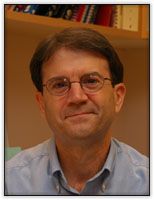
Joseph P. Bidwell, PhD
Professor of Anatomy, Cell Biology & Physiology
Professor of Medical & Molecular Genetics
- Phone
- (317) 278-1142
- Address
-
MS 1030
ANAT
IN
Indianapolis, IN - PubMed:
-

Bio
After earning a PhD from Case Western Reserve University, Joseph Bidwell did postdoctoral training at the Marine Biological Lab (WHOI Biology), the Mayo Clinic (Cell Biol) and at the University Massachusettes Medical Center (Molecular Biology).
Academic Appointments
1999-2009: IUSM Dept of Anatomy & Cell Biology Associate Professor
1999-2006: IUSD Dept of Periodontics Associate Professor
Honors
Shellhammer Teaching Award Department of Anatomy & Cell Biology IUSM 2010
Visiting Professor; Chulalongkorn and Naresuan Universities Thailand,1999 & 2004
Prestigious External Award Recognition (PEAR) IUSM 2003
R.R. Bensley Award, American Association of Anatomists 2002
The Distinguished Faculty Award for Research, IUSD 1999
Visiting Professor: Meikai University, Sakado, Japan 1997
| Year | Degree | Institution |
|---|---|---|
| 1993 | Postdoctoral Training | University of Massachusetts Medical Center |
| 1990 | Postdoctoral Training | Mayo Clinic |
| 1988 | Postdoctoral Training | Marine Biological Lab/WHOI Biology |
| 1983 | PhD | Case Western Reserve University |
| 1975 | BS | Bowling Green State University |
The Bidwell laboratory has an active program in elucidating the cellular and molecular mechanisms that underlie the skeleton’s response to anabolic stimuli, including parathyroid hormone (PTH), a potent osteoanabolic used to treat osteoporosis. A current primary focus of the laboratory is the identification of the mechanisms responsible for limiting PTH clinical efficacy or its anabolic window. Multiple approaches are brought to bear on this problem including the use of genetically modified mice, primary cell culture of mesenchymal stem cells, osteoprogenitors, and mature osteoblasts. Skeletal phenotypes are analyzed using DXA, uCT, and bone histomorphometry. The molecular methodologies utilized for identifying signal transduction, transcription, and translation pathways activated during the closing of the anabolic window include ChIP-seq, qRT-PCR, Western blotting, immunoprecipitations, mass spectrometry, and cell transfection/immortalization. Students participating in the Bidwell lab are trained to identify and develop an original and significant research question/hypothesis related to the overarching program.
Desc: Trustees' Teaching Award
Scope: University
Date: 2017-05-01
Desc: Trustees' Teaching Award
Scope: University
Date: 2013-05-01